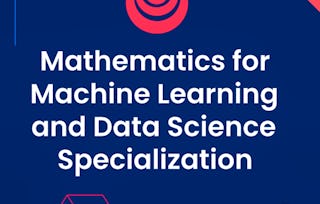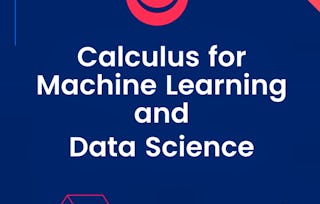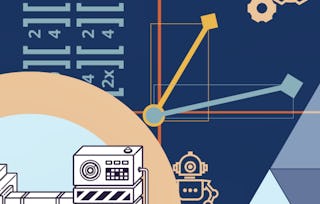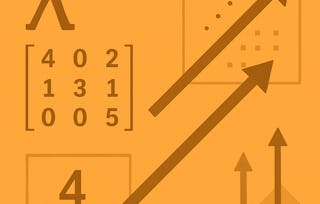Newly updated for 2024! Mathematics for Machine Learning and Data Science is a foundational online program created by DeepLearning.AI and taught by Luis Serrano. In machine learning, you apply math concepts through programming. And so, in this specialization, you’ll apply the math concepts you learn using Python programming in hands-on lab exercises. As a learner in this program, you'll need basic to intermediate Python programming skills to be successful.
Linear Algebra for Machine Learning and Data Science

Linear Algebra for Machine Learning and Data Science
This course is part of Mathematics for Machine Learning and Data Science Specialization

Instructor: Luis Serrano
197,283 already enrolled
2,313 reviews
Recommended experience
What you'll learn
Represent data as vectors and matrices and identify their properties using concepts of singularity, rank, and linear independence
Apply common vector and matrix algebra operations like dot product, inverse, and determinants
Express certain types of matrix operations as linear transformation, and apply concepts of eigenvalues and eigenvectors to machine learning problems
Skills you'll gain
Details to know

Add to your LinkedIn profile
9 assignments
See how employees at top companies are mastering in-demand skills

Build your subject-matter expertise
- Learn new concepts from industry experts
- Gain a foundational understanding of a subject or tool
- Develop job-relevant skills with hands-on projects
- Earn a shareable career certificate

There are 4 modules in this course
Matrices are commonly used in machine learning and data science to represent data and its transformations. In this week, you will learn how matrices naturally arise from systems of equations and how certain matrix properties can be thought in terms of operations on system of equations.
What's included
14 videos8 readings3 assignments1 app item2 ungraded labs
In this week, you will learn how to solve a system of linear equations using the elimination method and the row echelon form. You will also learn about an important property of a matrix: the rank. The concept of the rank of a matrix is useful in computer vision for compressing images.
What's included
12 videos5 readings2 assignments1 programming assignment1 ungraded lab
An individual instance (observation) of data is typically represented as a vector in machine learning. In this week, you will learn about properties and operations of vectors. You will also learn about linear transformations, matrix inverse, and one of the most important operations on matrices: the matrix multiplication. You will see how matrix multiplication naturally arises from composition of linear transformations. Finally, you will learn how to apply some of the properties of matrices and vectors that you have learned so far to neural networks.
What's included
14 videos3 readings2 assignments1 programming assignment3 ungraded labs
In this final week, you will take a deeper look at determinants. You will learn how determinants can be geometrically interpreted as an area and how to calculate determinant of product and inverse of matrices. We conclude this course with eigenvalues and eigenvectors. Eigenvectors are used in dimensionality reduction in machine learning. You will see how eigenvectors naturally follow from the concept of eigenbases.
What's included
20 videos7 readings2 assignments1 programming assignment1 ungraded lab
Earn a career certificate
Add this credential to your LinkedIn profile, resume, or CV. Share it on social media and in your performance review.
Instructor

Offered by
Explore more from Algorithms
 Status: Free Trial
Status: Free TrialDeepLearning.AI
 Status: Free Trial
Status: Free TrialDeepLearning.AI
 Status: Free Trial
Status: Free TrialImperial College London
 Status: Free Trial
Status: Free TrialBirla Institute of Technology & Science, Pilani
Why people choose Coursera for their career

Felipe M.

Jennifer J.

Larry W.

Chaitanya A.
Learner reviews
- 5 stars
74.68%
- 4 stars
17.49%
- 3 stars
3.67%
- 2 stars
1.77%
- 1 star
2.37%
Showing 3 of 2313
Reviewed on Aug 26, 2024
While people focus on teaching how to solve problems basically, It is very good to see people speak about maths like science as a concept with good visualization!. Great work guys.
Reviewed on May 27, 2023
Best Visual Explanation, I've got new thinking of the same things which I had learned in the Past. It great Course Thanks for making Such Amazing Content.
Reviewed on Jan 27, 2025
The explanation of key concepts related to eigenvalues and eigenvectors, and most importantly, demonstration of its applications is the most fundamental takeaway from this course.

Open new doors with Coursera Plus
Unlimited access to 10,000+ world-class courses, hands-on projects, and job-ready certificate programs - all included in your subscription
Advance your career with an online degree
Earn a degree from world-class universities - 100% online
Join over 3,400 global companies that choose Coursera for Business
Upskill your employees to excel in the digital economy
Frequently asked questions
This is a beginner-friendly course, aiming to teach the concepts covered with minimal background knowledge necessary. If you're familiar with the concepts of linear algebra, you'll find this course a good review for the next course in the specialization, Calculus for Machine Learning and Data Science.
Yes! We want to break down the barriers that hold people back from advancing their math skills. In this course, we flip the traditional mathematics pedagogy for teaching math, starting with the real world use-cases and working back to theory.
Most people who are good at math simply have more practice doing math, and through that, more comfort with the mindset needed to be successful. This course is the perfect place to start or advance those fundamental skills, and build the mindset required to be good at math.
Linear algebra (matrices, vectors, and their applications)
More questions
Financial aid available,